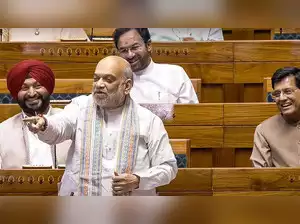Today marks a historic moment as Parliament has passed the ‘Waqf (Amendment) Bill, 2025′, bringing an end to decades of injustice and corruption, and paving the way for justice and equality, Union Home Minister Amit Shah stated on ‘X’ in Hindi.
He emphasized that the new amendment will introduce greater accountability, transparency, and fairness in the functioning of the Waqf Board and the management of Waqf properties. According to Shah, these reforms will especially benefit the poor, women, and children, ensuring that Waqf resources serve the purpose for which they were originally intended.
📌 What is Waqf?
Waqf is an Islamic charitable endowment where a person donates a property (like land, building, or money) for religious or charitable purposes. Once something is declared as waqf, it cannot be sold, gifted, or inherited—it’s managed for the benefit of the community.
In India, waqf properties are overseen by State Waqf Boards and coordinated by the Central Waqf Council under the Waqf Act, 1995.
⚖️ What is the Waqf Act?
- The Waqf Act, 1995, is a law that provides for the administration of waqf properties in India.
- The Act was amended in 2013 to give more powers to the Waqf Boards.
- It allows Waqf Boards to manage, lease, and even take back waqf land that has been encroached upon.
📜 What is the Waqf Bill Issue?
In recent years, especially around 2022–2023, the Waqf Act and Waqf Boards have come under scrutiny, and there’s growing demand to repeal or amend the Act due to several controversies:
🧨 Controversies Around Waqf Properties
- Unilateral Declaration:
- Waqf Boards allegedly declare properties as waqf land without proper notice or consent from current landowners.
- Several cases have emerged where individuals claim their private or ancestral land was suddenly declared waqf.
- Lack of Transparency:
- Accusations of corruption, mismanagement, and lack of audits of waqf properties.
- Huge land holdings are under Waqf, but there’s little clarity on how income is generated or used.
- Discrimination Allegation:
- Critics argue that there are religion-specific laws (like the Waqf Act) which favor one community.
- Demand for a Uniform Civil Code or scrapping of religion-based property laws is growing.
- Political Exploitation:
- The issue is often politicized, with some parties defending waqf laws as protection of minority rights, while others call it appeasement.
🏛️ Demand to Scrap or Amend the Waqf Act
Some key demands from activists and political groups include:
- Complete repeal of the Waqf Act.
- Investigation into land grabs and alleged misuse of the Act.
- Introduction of Uniform Property Law that applies equally to all citizens regardless of religion.
One of the most prominent voices has been Advocate Ashwini Upadhyay, who filed PILs questioning the constitutional validity of the Waqf Act.

📅 Recent Developments
- 2022-2023: Several state governments, including in Madhya Pradesh, Gujarat, and Maharashtra, reviewed waqf land records after allegations surfaced.
- Protests & PILs: Activists and organizations have taken to streets and courts demanding a revamp of the Act.
- Political Statements: BJP leaders and others have publicly demanded scrapping the Waqf Act, calling it “discriminatory.”
📊 Stats About Waqf Properties
- India has over 6 lakh waqf properties, making it one of the largest holders of charitable real estate.
- Total area is estimated to be more than 6 lakh acres.
- Many are in prime urban areas, leading to land disputes and encroachments.
🧭 Different Perspectives
| Perspective | View |
|---|---|
| Muslim Organizations | Say the Act is essential to protect endowments and serve community welfare. |
| Activists Opposing the Act | Call it unconstitutional and want equal laws for all. |
| Legal Experts | Point to vague provisions in the Act that can be misused, need for reforms. |
| Political Leaders | Some defend it as minority rights; others call it discriminatory. |
📝 Conclusion
The Waqf Bill issue is a complex mix of law, religion, politics, and property rights. While the intention behind waqf is charitable, the current system has raised serious concerns regarding transparency, fairness, and constitutionality. Whether the law is reformed or repealed, one thing is clear: a robust, transparent, and equitable system is needed to manage religious endowments in modern India.
Written by Vinay.k




Good